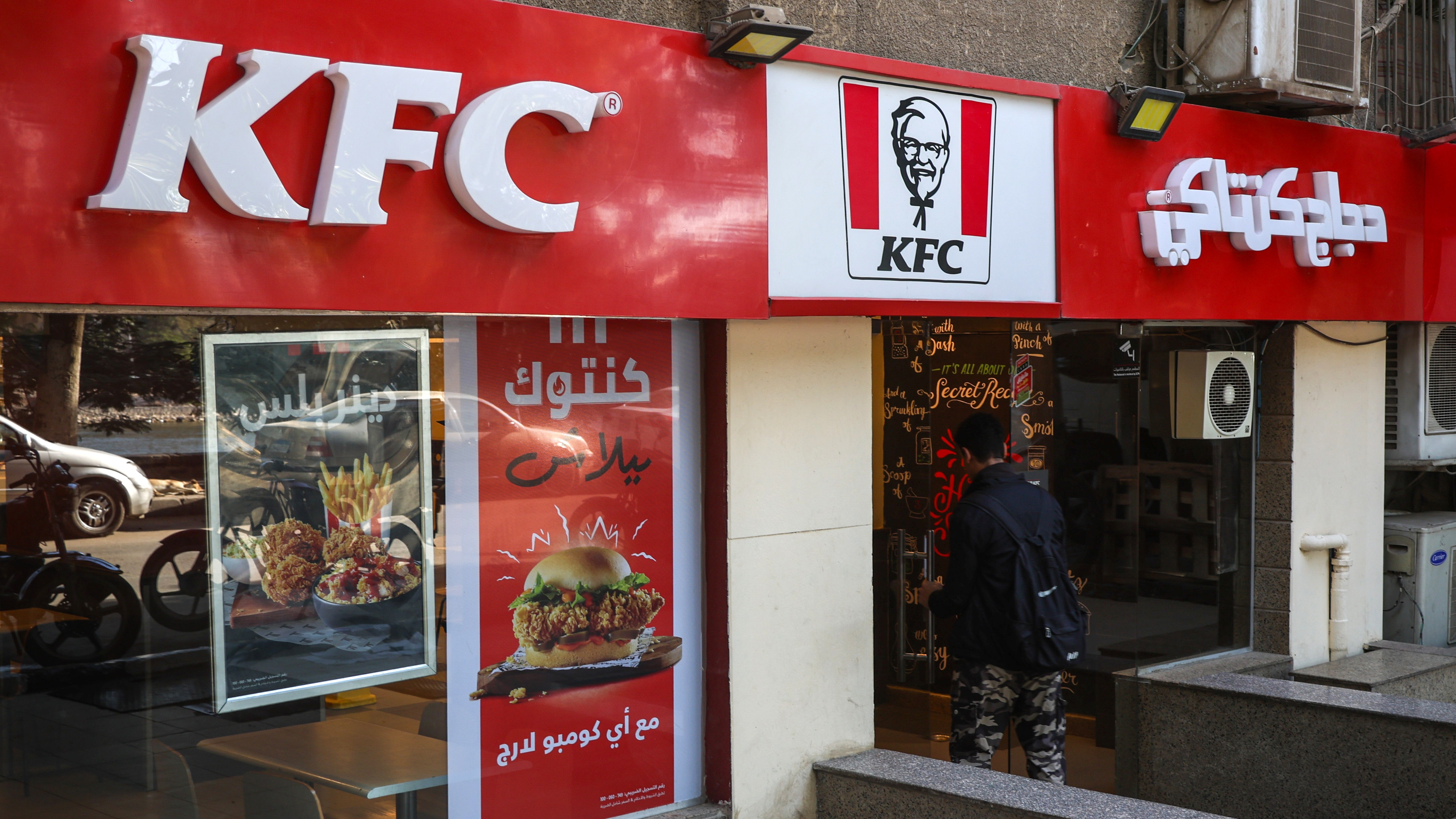Western brands under pressure from Middle East boycotts
Across the Middle East, consumers are "shunning" Western brands over their perceived stance on Israel-Gaza conflict

A free daily email with the biggest news stories of the day – and the best features from TheWeek.com
You are now subscribed
Your newsletter sign-up was successful
Widespread boycotts in the Middle East are "hammering" major brands such as Coca-Cola, KFC and Starbucks.
"From Egypt to Indonesia and Saudi Arabia to Pakistan, consumers are shunning goods" produced by popular food and drink multinationals in protest against "their perceived support for Israel in the war in Gaza", said the Financial Times.
The boycott of Western brands is "the most widespread in recent memory", said the paper, ultimately "underscoring how social campaigns can flare up suddenly and sting corporate behemoths".
The Week
Escape your echo chamber. Get the facts behind the news, plus analysis from multiple perspectives.

Sign up for The Week's Free Newsletters
From our morning news briefing to a weekly Good News Newsletter, get the best of The Week delivered directly to your inbox.
From our morning news briefing to a weekly Good News Newsletter, get the best of The Week delivered directly to your inbox.
One in three boycotting brands over Israel-Gaza war
The boycott of goods in protest is increasingly gaining traction across the globe, with more than one in three people "boycotting a brand viewed as supporting a side in Israel's war on Gaza", said the Middle East Eye. And "oil-rich Gulf states and large Muslim-majority countries" are "leading the way" on boycott action.
In an Edelman poll that surveyed 15,000 consumers across 15 countries, three of the top five countries listed as engaged in boycotting brands over Gaza were Muslim-majority nations – Saudi Arabia, the UAE and Indonesia. India, which has a large Muslim minority, came fourth in the poll, while Germany came fifth.
In Saudi Arabia, 71% of respondents said they were boycotting brands over their perceived support for one side, while in UAE, 57% of respondents said they were boycotting brands over the war. In Indonesia, more than 50% said they were also involved in boycotts.
Consumer boycotts of Western brands in the Middle East have a "long history", and are "often rooted in political, religious and cultural conflicts", said foreign affairs think-tank Stimson.
A free daily email with the biggest news stories of the day – and the best features from TheWeek.com
The Boycott, Divestment and Sanctions Movement, a non-violent, Palestinian-led campaign targeting Israel began to gain traction in 2005, "a year the International Court of Justice deemed Israel's security barrier in the West Bank a violation of international law", said The Jerusalem Post, and it has only gained further support after the breakout of Israel's war in Gaza.
Boycotts 'now hitting revenues'
The targeting of brands may have "symbolic importance" but it is "unlikely to impact Israel's economy" directly, whose "strength lies in sectors such as technology, pharmaceuticals and defence", areas which are "less susceptible to consumer boycotts", said Stimson.
But for several major multinational companies, boycott action is "now hitting revenues", said the FT. While many multinational corporations facing boycott action have been able to "absorb the hit to sales as a result of their geographic and category spread", their franchise operators in countries "where boycotts are rife" are getting off "less lightly", said the FT.
Amarpal Sandhu, chief executive of Americana Restaurants, which operates brands such as KFC, Pizza Hut and Krispy Kreme across the Middle East and Kazakhstan, has called the length and intensity of the boycotts "unprecedented" in an earnings call on Thursday.
Earlier this week the company said that its second-quarter profits were down 40% compared with the same period last year, "despite opening 81 restaurants in the first half of this year". Snack-maker Mondelez also said the boycotts had weighed down their sales growth by 2% in the second quarter, while L'Oréal said boycotts had contributed to a 2% drop in their sales growth in the first half of this year.
But the boycotts of Western products have also "presented a crucial opportunity for new emerging local brands" in Middle Eastern nations, said The Jerusalem Post. In Egypt, products from Spiro Spathis, an Egyptian soft drink company, have "become a preferred substitute for Coca-Cola and Pepsi throughout the country".
-
 Properties of the week: pretty thatched cottages
Properties of the week: pretty thatched cottagesThe Week Recommends Featuring homes in West Sussex, Dorset and Suffolk
-
 The week’s best photos
The week’s best photosIn Pictures An explosive meal, a carnival of joy, and more
-
 The ‘ravenous’ demand for Cornish minerals
The ‘ravenous’ demand for Cornish mineralsUnder the Radar Growing need for critical minerals to power tech has intensified ‘appetite’ for lithium, which could be a ‘huge boon’ for local economy
-
 Is the US in a hiring recession?
Is the US in a hiring recession?Today's Big Question The economy is growing. Job openings are not.
-
 Trump wants a weaker dollar, but economists aren’t so sure
Trump wants a weaker dollar, but economists aren’t so sureTalking Points A weaker dollar can make imports more expensive but also boost gold
-
 Tariffs have American whiskey distillers on the rocks
Tariffs have American whiskey distillers on the rocksIn the Spotlight Jim Beam is the latest brand to feel the pain
-
 The longevity economy booms as people live longer
The longevity economy booms as people live longerThe Explainer The sector is projected to reach $27 trillion by 2030
-
 How will China’s $1 trillion trade surplus change the world economy?
How will China’s $1 trillion trade surplus change the world economy?Today’s Big Question Europe may impose its own tariffs
-
 Texas is trying to become America’s next financial hub
Texas is trying to become America’s next financial hubIn the Spotlight The Lone Star State could soon have three major stock exchanges
-
 Employees are branching out rather than moving up with career minimalism
Employees are branching out rather than moving up with career minimalismThe explainer From career ladder to lily pad
-
 Who will be the next Fed chair?
Who will be the next Fed chair?Today's Big Question Kevin Hassett appears to be Trump’s pick